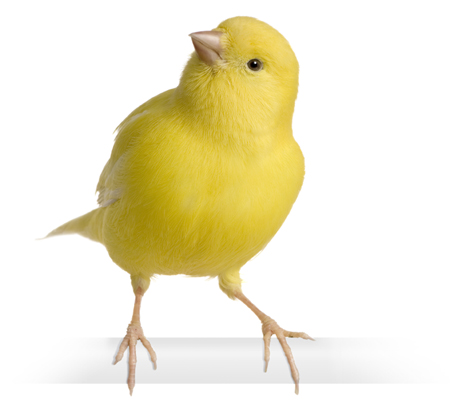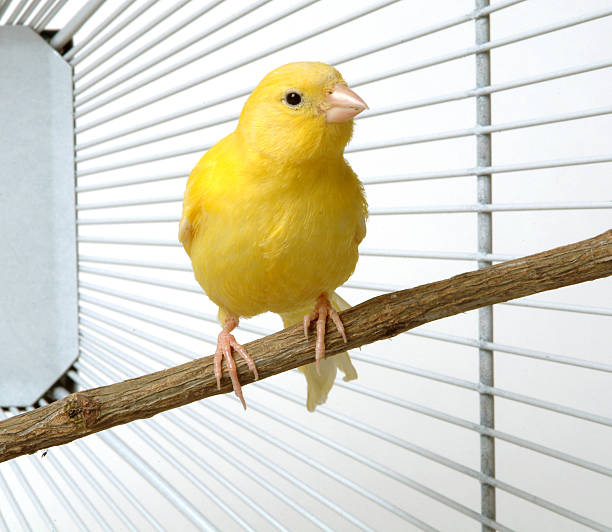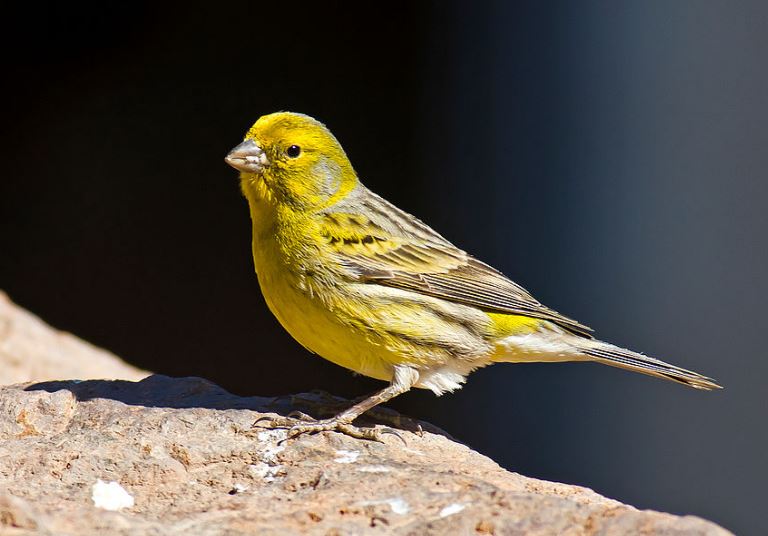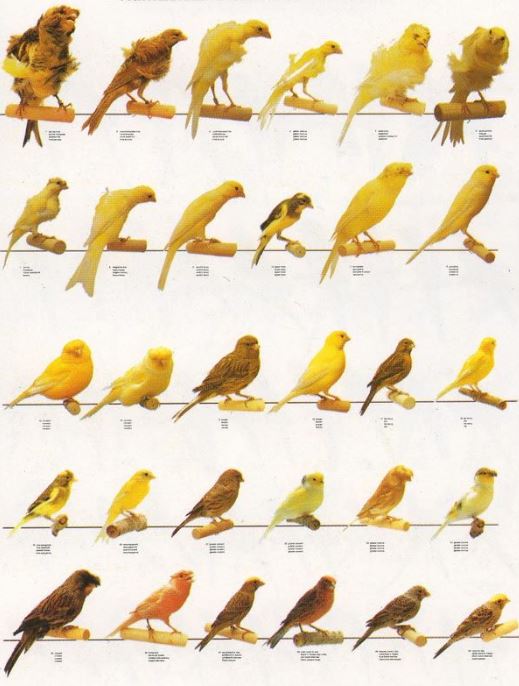Simple Canary Care Tips That Will
Make Your Pet Bird S-I-N-G!
"Welcome. I want to show you how to quickly and easily use SMART canary care to keep your pet bird happy and healthy."
Answering hundreds of questions like...
- What kind of canary cage do I need?
- Does my pet canary need special care?
- What is the molt?
- Why won't my canary sing?
- What can I feed my canary?
...and a whole bunch more.
Use these simple tips like a pro on subjects like health care, canary disease, canary foods, training tips, increasing singing, AND bonding and communicating with your bird.
Where Did The
Pet Canary Come From?
The canary is a bird that is native to the Canary Islands off the coast of Africa.
They were first captured, kept as pets, and bred starting in the 1600s. They first became popular in Spain, Italy, and England then eventually spread to all of Europe and the entire planet.
In the beginning, Monks took up the trade of breeding and selling canary birds. They only sold males, which are the singers, to try and keep a monopoly on the bird business.
But soon others were getting hold of hens and breeding their own canaries. The canary bird has now developed into dozens of varieties, colors, sizes, and singing styles.
FREE Email Course.
Sign up below and get the 5 part email course: "The #1 Problem You Will Face As A Canary Owner"
Are you providing smart canary care? By doing so you CAN make your canary bird S-I-N-G...literally and figuratively.
His company, along with his beautiful singing voice, can...
--Raise your spirits and lower your blood pressure
--Move your heart and slow your aggravations
--Provide companionship when you're feeling alone
With smart canary care you WILL make your canary bird S-I-N-G!
 Pet Canary
Pet Canary
Since I Was 8 Years Old...
...I've been a big fan of pet birds. I started with parakeets, spent some time with cockatiels, but ended up with canaries. I'm pushing 50 years of age now so I've been doing this awhile.
Once I was introduced to canary birds by my uncle I fell hopelessly in love with these little "sugar birds" and decided to start breeding them.
I created CanaryAdvisor.com to show you how best to take care of these great pets and get the most out of owning one or more...and maybe even give canary breeding a try for yourself.
The canary is more beautiful than you ever imagined. Sure, they're pretty to look at but...
To own one gives you the joy of listening to beautiful natural bird songs and the delightful visual splash of color and activity inside your home. And it's nowhere near as difficult as some make it out to be.
All you need is enough information, and a reasonable measure of common sense. I like to think that I can offer you plenty of both, so let's get started with some canary tips...
Canary Care Secrets?
The secret to your canary's happiness is no secret at all. The information you need is right at your finger tips here on CanaryAdvisor.com and in the Canary Tips! E-zine.
In a nutshell, here's what you want to do...
1. Provide all your canary's needs like...
- A high quality canary seed mixture.
- Fresh clean water.
- Clean and roomy housing.
- Health care to keep your canary bird disease free.
2. Then allow some joy into your bird's world such as...
- Special delicious and nutritious treats.
- Allowing him out of the cage for a bout of flying.
- Entertainment in the form of items to pick up and carry around, a mirror (only if he doesn't fight with it), and a swing.
3. Plus...communicate with your canary...
- Speaking with soft words.
- Using gentle body movements.
Great canary care starts with knowledge.
Easy Pet Canary Knowledge...
Your canary is depending on YOU to provide all his needs and wants.
So come along with me now and lets take a look at CanaryAdvisor.com's helpful articles.
-
You'll discover how proper canary care can get your pet canary
bird into strong physical shape and develop a healthy confident
attitude.
-
Plus proper feeding for optimal nutrition, the right
snack foods to offer...and what foods can kill him. Also,
false information your pet shop attendant may be giving you...
-
I'll reveal hard-to-find details about...
...where to snag the best deals on cages, supplies, and canary bird food.
-
I'll point you to great websites where you can search for a
canary for sale.
- And learn to read your pet birds body language...What is he trying to tell you?
- Sick bird? You must act quickly!
Just click on one of the links below and discover canary bird care that will help you become "family" to your pet canary bird.
What Is A Canary?
Really? I mean...really?
OK, I'm just playing around a little. We all know what a canary is right?
You and I both know that a canary is a small domesticated pet bird with a beautiful song.
But the reason I ask, "What is a canary?" is because there is a whole lot more to canaries than most people realize.
- The canary is a passerine bird belonging the Finch family. Yep, it's a finch.
- It's exact name is the Atlantic Canary (Serinus Canaria).
Where Does The Canary Come From?
The wild Atlantic Canary is native to Africa...more specifically to the Canary Islands. Makes sense.
Early Spanish explorers began capturing the birds and selling them back on the mainland as pets.
From there, pet canaries drifted into Italy and other parts of Europe and Asia. And eventually around the entire world. There are even tropical canaries being bred in Alaska just south of the Arctic circle!
***Did you know that there are Canary Dogs also? They're the Canary Mastiff from the Canary Islands. They're HUUUGE...

What Do Canary Birds Look Like?
The original non-domesticated wild canary is actually more green than yellow. And actually looks a bit like a green sparrow with dark markings like a sparrow.
Over the centuries new breeds were developed with many different sounding songs and colors.
Today's domesticated pet canary can be found in a variety of colors and with a variety of markings and physical attributes.
- White, blue, orange, red.
- Plain, spotted, speckled.
- Smooth or fluffy.
- Short or tall.
- Skinny or round.
How Big Do Canaries Get?
The wild Atlantic Canary bird usually measures about 4 to 5 inches (10 to 12 cm) head to tail with a wingspan of about 9 inches (22 cm). And weighs in at a little under 1 ounce.
Domesticated canary birds can be slightly smaller or larger than that depending on the breed.
Why Do People Keep Canaries?
There are lots of little birds to be found around the world but none of them sing like the canary.
So, Reason #1: Their incredible song.
But, also, they are easily kept and bred. They do well in captivity when provided good canary care.
Thousands of breeders earth-wide love to breed selectively for different song styles, colors, sizes, and shapes.
What Do Canary Birds Eat?
The wild canary eats small insects, seeds, sprouted seeds, and grasses.
The domesticated variety do well on a seed mix usually containing canary grass seed, rape seed, Niger seed, and millet.
Pet canaries are also usually given boiled egg for protein and fat.
Fruits and veggies round out a good pet canary diet...berries, apple, strawberry, broccoli, dark green lettuces, and spinach.
Whole grains such as rice, corn, and oatmeal are fed occasionally in small amounts.
A variety of whole foods is an important part of good canary care.

Do Canaries Like People?
The pet canary bird is generally fearful of it's owners.
But if handled when young, and regularly, can become very relaxed and friendly around people. Some have been trained to come when called and to eat out of hands.
Does A Pet Canary Need A Partner?
Nope.
A household canary can do quite well in a cage by himself.
Would he be happier with other canaries around? Probably.
I often recommend a canary owner get a Canary Song CD or buy a second bird and cage to be placed at the opposite end of the room...or in a nearby room where they can sing and chirp to each other.
***Two or more canaries in a small cage often fight and peck each other. Plus, it usually stops a canary from singing. Not good canary care.
Do All Canaries Sing?
Nuh-uh. Typically, only the mature male canary sings. The hen usually just chirps.
However, there are some hens who have been known to sing almost as good as the males...I'd say around 10% of females will sing.
The males will start singing at sexual maturity which is at around 9 months of age.
Then, at middle age, around 7 or 8 years of age the singing will slow and eventually stop as male hormones decline.
These are just general rules...Many canaries continue to sing beyond 10 years of age.
How Long Do Canaries Live?
It's a pretty big window of time...
To the great disappointment of canary lovers everywhere, canaries will often die with little warning, and with seemingly no reason, under 3 years of age. Even with great canary care provided.
But others will live on into their teens. I've even heard reports of canaries living to near 20 years of age.
On average, you can expect your canary to live to around 10 years of age.
***Unfortunately, irresponsible in-breeding often causes canaries to be born with health issues that sometimes result in early death.
Are Canaries Hard To Take Care Of?
Not at all.
They just need a home with a stable temperature, some fresh seed and water each day, and they'll usually do quite well.
You can even give your canary a multi-day supply of seed and water and take a short vacation.
Some other things your pet canary bird might like...
- To be let out of the cage for a few minutes each day for some exercise.
- A small amount of fruit, veggie, or boiled egg as a snack daily.
- A cage that is kept clean of droppings and old food.
- A home where he won't be harassed by cats, dogs, or children.
- A smoke-free and chemical-free home.
What Is 'Molting'?
MOLTING is the process of shedding last year's old feathers and then growing new feathers to replace them.
Hard to believe but canaries have over 2000 feathers that need to be regrown in a period of about 2 months.
It happens once each year with canaries.
The molt starts after breeding and raising their young chicks. That's around mid-summer (end of June, start of July). It lasts about 2 months or more.
This is a strenuous time for canary birds. Growing all those feathers takes a lot of energy.
Your canary will become listless, restful, and will likely stop singing during this time.
What Else Should I Know About Pet Canary Care?
Here are few more tips to help you provide great canary care...
1. Pet canaries are three-season animals. Spring is for breeding and raising young. Summer and Fall is for molting...losing and growing new feathers. Winter is time to rest and recuperate while getting ready to breed again in the spring.
***No, you don't have to breed your canaries. But you do need to regulate their seasons by covering their cage at sundown and uncovering at sunrise.
2. Pet canary birds are light sensitive...Their hormones, and their 3 seasons, are regulated by the number of daylight hours they're exposed to.
In the summer their days can be as high as 16 hours long. But in the winter should be no more that about 10 hours long.
3. Canaries have sensitive respiratory systems. Smoke, fumes, and chemicals can irritate and even permanently damage their airways...potentially resulting in death.
4. You can get a breeding pair and raise babies. This is too much fun. But it doesn't always go perfectly.
If all this sounds complicated, don't fret. It's much easier than it sounds. And more canary keepers have success than those that fail.
So, if you've read this far (and you have), it's obvious that you're interested in having a pet canary.
Do it! Try it!
Good things can happen.
|
Canary Care FAQ: Frequently Asked Questions
Question: How do you take care of a canary bird?
Question: How do you take care of a canary bird?
Answer: Simple...Provide fresh water in a bird waterer or a shallow dish. Also, provide a canary seed mixture available at any pet store. Your canary will also appreciate small amounts of romaine lettuce, boiled egg, and apple. Use a bird cage that has horizontal length so your canary can flutter back and forth. Cover the cage at sundown and uncover at sunrise.
Question: Are canaries easy to take care of?
Question: Are canaries easy to take care of?
Answer: Yes, pet canaries are fairly easy to take care of. They do well being the only bird in the cage and can be left alone for extended periods of time. Just provide fresh water, canary foods, cover the cage at sundown, uncover at sunrise, and your bird should do quite well.
Question: Do canary birds like to be held?
Question: Do canary birds like to be held?
Answer: Canaries typically do not like to be held although there are a few who tolerate it well. It is common, when raising a canary from a young age that he will become comfortable enough with you that he will enjoy flying around the room and landing on your head or shoulder.
Take The Tour...
After you've signed up for CanaryTips Ezine, take a tour of CanaryAdvisor.com. Below are numerous articles on canary care to get you started...
- Canary Song
- What's the #1 Way to Increase Canary Song? Use the same results-oriented trick that award-winning breeders use...
- 101 Favorite Canary Bird Supplies. Canary Seed, Treats, Cages, Meds and More.
- 101 Highly Recommended Canary Bird Supplies and Products By CanaryAdvisor.com
- Canary Care GOLD!
- Canary care guidance from an experienced canary professional. Ask your question now...
- What's New With Canary Birds and Canary Care?
- Canary care updates and time sensitive information regarding your pet canary bird.
- Canary Tips
- Using the right canary tips you can become your canary's best friend...and keep him S-I-N-G-I-N-G!
- How To Catch and Hold Your Canary In Three Easy Steps eCourse
- Get your free copy of How To Catch and Hold Your Canary In Three Easy Steps...For His Own Good eCourse
- About Me And My Site.
- About Me And My Site.
- Providing The Best Canary Foods For Your Canary.
- Canaries are what they eat. Good canary foods mean a happy and healthy pet bird...and a S-I-N-G-I-N-G one too...
- Provide A Good Canary Cage and Make Your Canary Sing!
- Keep in mind three things regarding your canary cage...Size and Shape, Location, and Furnishings. Simple guidelines for a simple pet...
- Canary Health For Your Canary Bird Including Prevention,Treatment, Canary Care.
- Canary Health. Don't let your canary bird get down in the dumps--or down on the floor of the cage in this case--Does your canary have good health? Are you sure?...Canary Care
- Canary Disease
- Imagine a bright, cheerful, singing companion free from canary disease. Definitions of the most common pet bird diseases...plus treatment information for great canary care.
- Sick Canary Symptoms
- Sick canary symptoms. Before you can wage war on canary disease you must know what to look for...
- Canary Illness. First Actions To Take With A Sick Canary Bird.
- Canary Illness. Save your canary bird! First-things-first...when confronted with a sick bird the most important thing you can do is make your bird comfortable. I'll show you how...
- Canary Illnesses and Effective Medicinal Treatment for Your Pet Canary
- Wage war on canary illnesses. Powerful tips for treating your sick canary bird with medicines...Which medicines to use and when...
- A Pet Canary Bird Can Be A Pleasant Addition To The Family
- The pet canary bird and the simple joys of pet canary ownership...
- Find A Canary For Sale.
- Canary For Sale. Listings of available birds. Tips and techniques for finding that perfect canary bird for sale...
- The Three Canary Types...Song, Color, and Type.
- Fun-Facts about the three canary types and their hundreds of breeds of canaries.
- All About Breeding Canaries.
- All About Breeding Canaries. Discover the joys of breeding canaries...
- Canary Care Site Map CanaryAdvisor.com
- Canary care site-map. Information on feeding, housing, health care, breeding, and where to get the best deals on canary bird products.
- Search CanaryAdvisor.com
- Search CanaryAdvisor.com or the Web
- CanaryAdvisor.com -- Contact Us
- comments
- #1 Most Important Problem You Will Face as a Canary Owner-Free Ecourse
- Get your free canary course about the #1 most important problem you will face as a canary bird owner














